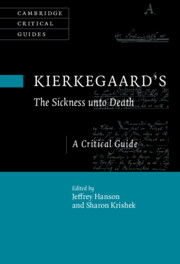Book contents
- Kierkegaard’s The Sickness unto Death
- Cambridge Critical Guides
- Kierkegaard’s The Sickness unto Death
- Copyright page
- Contents
- Contributors
- Acknowledgments
- Abbreviations
- Introduction
- Chapter 1 Kierkegaard’s Place of Rest
- Chapter 2 Publishing The Sickness unto Death
- Chapter 3 Kierkegaard on the Self and the Modern Debate on Selfhood
- Chapter 4 From Here to Eternity
- Chapter 5 Kierkegaard’s Metaphysics of the Self
- Chapter 6 The Experience of Possibility (and of Its Absence)
- Chapter 7 Sin, Despair, and the Self
- Chapter 8 Sin and Virtues
- Chapter 9 Despair as Sin
- Chapter 10 Fastening the End and Knotting the Thread
- Chapter 11 Despair the Disease and Faith the Therapeutic Cure
- Chapter 12 The Long Journey to Oneself
- Chapter 13 Accountability to God in The Sickness unto Death
- Bibliography
- Index
- Cambridge Critical Guides
Chapter 11 - Despair the Disease and Faith the Therapeutic Cure
Published online by Cambridge University Press: 26 August 2022
- Kierkegaard’s The Sickness unto Death
- Cambridge Critical Guides
- Kierkegaard’s The Sickness unto Death
- Copyright page
- Contents
- Contributors
- Acknowledgments
- Abbreviations
- Introduction
- Chapter 1 Kierkegaard’s Place of Rest
- Chapter 2 Publishing The Sickness unto Death
- Chapter 3 Kierkegaard on the Self and the Modern Debate on Selfhood
- Chapter 4 From Here to Eternity
- Chapter 5 Kierkegaard’s Metaphysics of the Self
- Chapter 6 The Experience of Possibility (and of Its Absence)
- Chapter 7 Sin, Despair, and the Self
- Chapter 8 Sin and Virtues
- Chapter 9 Despair as Sin
- Chapter 10 Fastening the End and Knotting the Thread
- Chapter 11 Despair the Disease and Faith the Therapeutic Cure
- Chapter 12 The Long Journey to Oneself
- Chapter 13 Accountability to God in The Sickness unto Death
- Bibliography
- Index
- Cambridge Critical Guides
Summary
One of the nagging uncertainties that besets the interpretation of The Sickness unto Death is the vagueness that attaches to the promised cure for the disease of despair – faith. Presented in algebraic form at the beginning, middle, and end of the book, it is otherwise left without much expatiation. This chapter reconstructs from the text what we might be able to claim confidently about faith as the cure for despair according to Anti-Climacus. Faith has a therapeutic function: It is meant to extirpate from the self the only genuine danger, which is persistence in unforgiven sin, while maturing the self to cope with the ordinary hazards of human life and to avoid its false consolations. This twofold function of faith – positively warning the self against its only real threat and negatively clearing away false consolations and imagined dangers – is grounded in the definition of faith Anti-Climacus supplies, which involves two distinct elements: willing to be yourself and resting transparently in God. This chapter explores the precise sense in which the faithful self relates to God and the therapeutic benefits that come from the faithful person’s ability to genuinely will to be themselves.
- Type
- Chapter
- Information
- Kierkegaard's The Sickness Unto DeathA Critical Guide, pp. 182 - 199Publisher: Cambridge University PressPrint publication year: 2022
- 1
- Cited by

